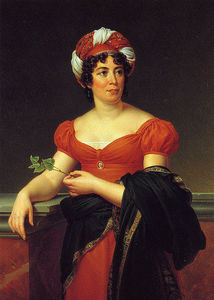Liberty Matters
The Many Windows of the World

Benjamin Hoffmann asks an interesting question: assuming we have a clearer idea of what enthusiasm is in Madame Staël's view, how can we use this concept to fight the animosity of political fanaticism? I am not sure I have a good answer to this question. For the moment I'd like to return to what Staël regarded as the core of fanaticism before we try to solve the puzzle. I use the word puzzle on purpose because like Professor Hoffmann, I am intrigued that Staël proposed enthusiasm as a cure for fanaticism.
In her opinion, fanaticism consists in the attempt to derive everything from a single idea. (Morality, she notes, is the only single idea that seems innocuous[99]). Those who fall prey to fanaticism discredit every cause or principle by drawing extreme consequences from what at the outset may very well be a valid idea or value. Thus, there are fanatics of reason, liberty, equality, and inequality, but also of justice, duty, virtue, property, nation, and noninterference. In turn, each group can be divided into various subgroups and nuances. They all use litmus tests to distinguish between the pure and impure ones, the worthy and unworthy ones. And they all dislike compromise. Their basic idea is that no good principle or value may ever be the object of a reasonable compromise with other values and principles.
This is what Isaiah Berlin understood by the danger of monism. It has to do with the temptation to reduce the diversity of the world to one dimension and judge everything else in light of it. This tendency becomes dangerous and is pregnant with significant political implications when we assess the legitimacy of institutions and evaluate proposals for reforming them. In this regard, fanatics of all stripes prove to be intransigent and unmoved by any criticism or debate; they know the answers before any questions are asked. To give just a few examples, for some who believe that Marx had all the answers to our political questions, capitalism is vicious and inhuman simply because it engenders inequality. All millionaires or billionaires, without exception, are evil. Private property is theft, and Wall Street must be occupied. For those who endorse an originalist interpretation of the U.S. Constitution, any attempt to question the idea of retrieving the original intention of the Founding Fathers is declared a nonstarter. For still others, any attempt to increase taxes is a sign of socialism. The list goes on and on.
Madame de Staël opposed this intransigent approach. No social or political question can be decided, she believed, except by trying to find a judicious balance between the pluses and minuses of all proposed solutions. All we can do is balance inconveniences, compare, and calculate. There is no absolute good on earth, pure and untainted by the imperfection of our realm.[100] That is why, for moderates like Staël (and Berlin), the world can and should never be seen through any single window. Such a unique window is only a figment of the imagination. Our social, political, and personal lives presuppose a permanent tension and confrontation amongdifferent ideas and principles. Our task is to try, as best as we can, to find a decent balance among them. Any absolute idea or principle is simply an impossibility, a utopian and costly dream.
To conclude, in response to Professor Hoffmann's question, I am prepared to make the following suggestion. It is no accident that Madame de Staël makes an éloge of enthusiasm in the concluding section of the second volume of De l'Allemagne. Her book was criticized by Napoleon and his followers for not being French. They judged her work from a narrow perspective according to which it was unacceptable that a French liberal would go to such lengths to praise the culture and institutions of a rival country. Staël saw no contradiction in this approach. For her, enthusiasm was a form of openness toward the world, combined with an appreciation for the plurality of cultures, institutions, mores, and customs. Such an openness was supposed to foster an ecumenical spirit combining a genuine appreciation for the universal with a recognition of national differences. Far from being a shallow form of cosmopolitanism, it is a fruitful and thoughtful way to overcome our selfishness and narrowness. When we manage to do that, we are freed from the obsession with any single idea, principle, or nation. Understood in this light, enthusiasm gives us a chance to be re-enchanted by the beauty of the world around us. It opens for us many windows through which we can contemplate its richness and diversity.
Endnotes
[99.] "La morale est la seule idée unique sans danger," (Des Circonstances actuelles, p. 255).
[100.] See Des Circonstances actuelles, pp. 48-49.
Copyright and Fair Use Statement
“Liberty Matters” is the copyright of Liberty Fund, Inc. This material is put on line to further the educational goals of Liberty Fund, Inc. These essays and responses may be quoted and otherwise used under “fair use” provisions for educational and academic purposes. To reprint these essays in course booklets requires the prior permission of Liberty Fund, Inc. Please contact oll@libertyfund.org if you have any questions.